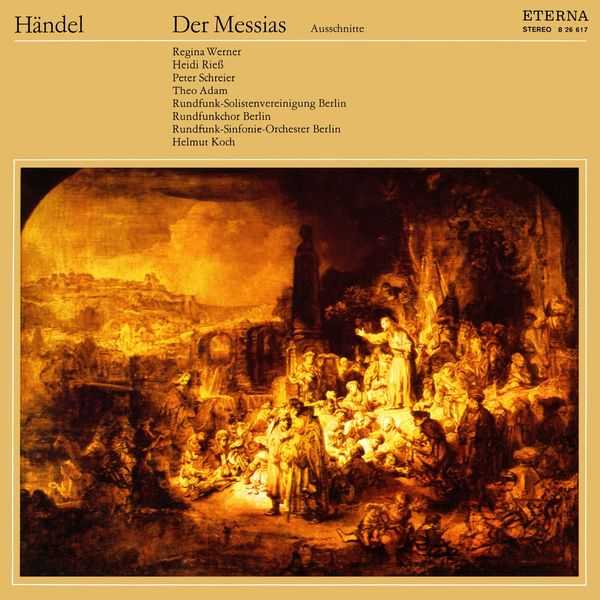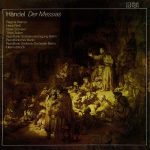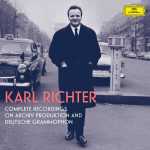
Composer: Georg Friedrich Händel
Performer: Rundfunkchor Berlin, Solistenvereinigung des Berliner Rundfunks, Peter Schreier, Theo Adam, Heidi Rieß, Regina Werner
Orchestra: Rundfunk Sinfonieorchester Berlin
Conductor: Helmut Koch
Format: FLAC (tracks)
Label: Eterna
Release: 2006
Size: 330 MB
Recovery: +3%
Scan: cover
Der Messias, HWV 56
Teil 1
01. Sinfonia
02. No. 1, Tröstet ihr mein Volk
03. No. 2, Alle Tale macht hoch erhaben
04. No. 3: “Denn die Herrlichkeit Gottes, des Herrn”
05. No. 11: “Das Volk, das da wandelt”
06. No. 12. Denn es ist uns ein Kind geboren
07. No. 13: Sinfonia pastorale
08. No. 18a: “Er weidet seine Herde”
Teil 2
09. No. 38: “Warum denn rasen die Heiden”
10. No. 39: “Auf, zerreißet ihre Bande”
11. No. 40: “Der da wohnet im Himmel”
12. No. 41: “Du zerschlägst sie”
13. No. 42: “Halleluja”
Teil 3
14. No. 43: “Ich weiß, daß mein Erlöser lebet”
15. No. 45: “Vernehmt, ich künd’ ein Geheimnis an”
16. No. 46: “Die Tromba erschallt”
17. No. 52: “Amen”
Handel’s Messiah was translated into German in the middle of the nineteenth century by scholar Gottfried Gervinus, and this disc of highlights gives an idea of his work. Translated versions of vocal works are always welcome in the recording catalogs, for until later, vocal works were often, even usually, heard that way in European countries. The affinities between the German and the English biblical language employed are strong enough that the accents fall in the right places; given the familiarity of the music itself, German speakers can actually forget they’re listening to anything out of the ordinary. However, these excerpts are drawn from a full recording of Messiah that harks back to olden times in other ways as well, not all of them desirable . The recording was released in 1975, when period performance was hardly an issue at all. That’s not a problem in itself, but the Rundfunk-Sinfonieorchester Berlin under Helmut Koch offers a pretty good example of what drove young string players into historical-instrument programs at European universities. Tempos are slow, and the giant orchestra seems to artificially drag, like those exercisers who carry weights with them in order to build muscle strength. The Brucknerian treatment of the Pifa is almost unlistenable in its avoidance of a fixed tempo, and the sound is bizarrely spread out, like that of the Japanese easy listening records that crowded shelves of audiophile stores during that era. It’s all a bit of a shame, because the soloists were all top-notch singers and attacked the work with enthusiasm. Bass Theo Adam is especially commanding in his involvement in the text — sample track 16, “Die Tromba erschallt” (The trumpet shall sound), for the best the performance has to offer. Fans of Adam and tenor Peter Schreier may want to have this unusual item, which otherwise will appeal mainly to curiosity seekers.



